Last updated on July 14th, 2023 at 05:26 pm
Discover the truth behind the question Do rabbits cry? Unveiling the intriguing world of rabbit emotions and shedding light on whether these adorable creatures shed tears.
Introduction
Among many animal lovers worldwide, rabbits have captured their hearts with their adorable floppy ears and fluffy tails. Because rabbits are curious creatures, we naturally wonder if they cry. This comprehensive article examines the fascinating world of rabbits and explores their emotional expressions in detail. Discover the truth about the age-old question, “Do rabbits cry?” Join us as we discover the truth about rabbits’ emotional expressions.
Do Rabbits Cry?
As opposed to humans, rabbits have a different function for their tears. While rabbits can tear, the purpose of their tears differs from ours.
Tears produced by rabbits are generally associated with eye health and are a natural component of their eye-cleaning system. They keep their eyes lubricated and free of debris. When rabbits have irritated eyes or a foreign object in their eyes, tear production increases to remove the irritant.
There is, however, a significant difference between rabbits and humans. In contrast to humans, rabbits tend to shed tears primarily as a physiological reaction to sadness or pain. Their tears are primarily a physiological response rather than an expression of emotion. Typically, rabbits communicate distress or discomfort through vocalizations, body language, or changes in eating or grooming.
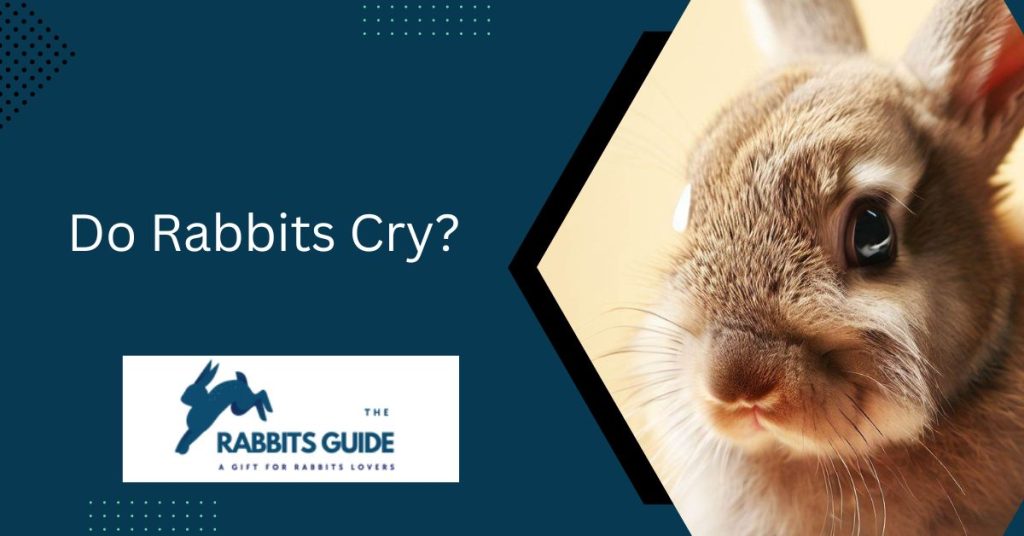
Understanding Rabbit Behavior
Rabbits’ behavior and communication methods must be understood before we can determine whether they shed tears. Rabbits are highly expressive animals that use a variety of cues to communicate their emotions. Body language, vocalizations, and subtle facial expressions are among these cues.

Body Language and Vocalizations
The body language of rabbits involves a variety of postures and movements. When a rabbit is relaxed and content, its ears may be erect, and its body stretched out. In contrast, when rabbits feel threatened or afraid, they hunch down and flatten their ears against their bodies.
Regarding vocalizations, rabbits typically use soft purring sounds to express contentment and happiness. They may also emit high-pitched squeaks or growls when feeling threatened or agitated. However, despite their diverse vocalizations, rabbits can’t cry as humans do.
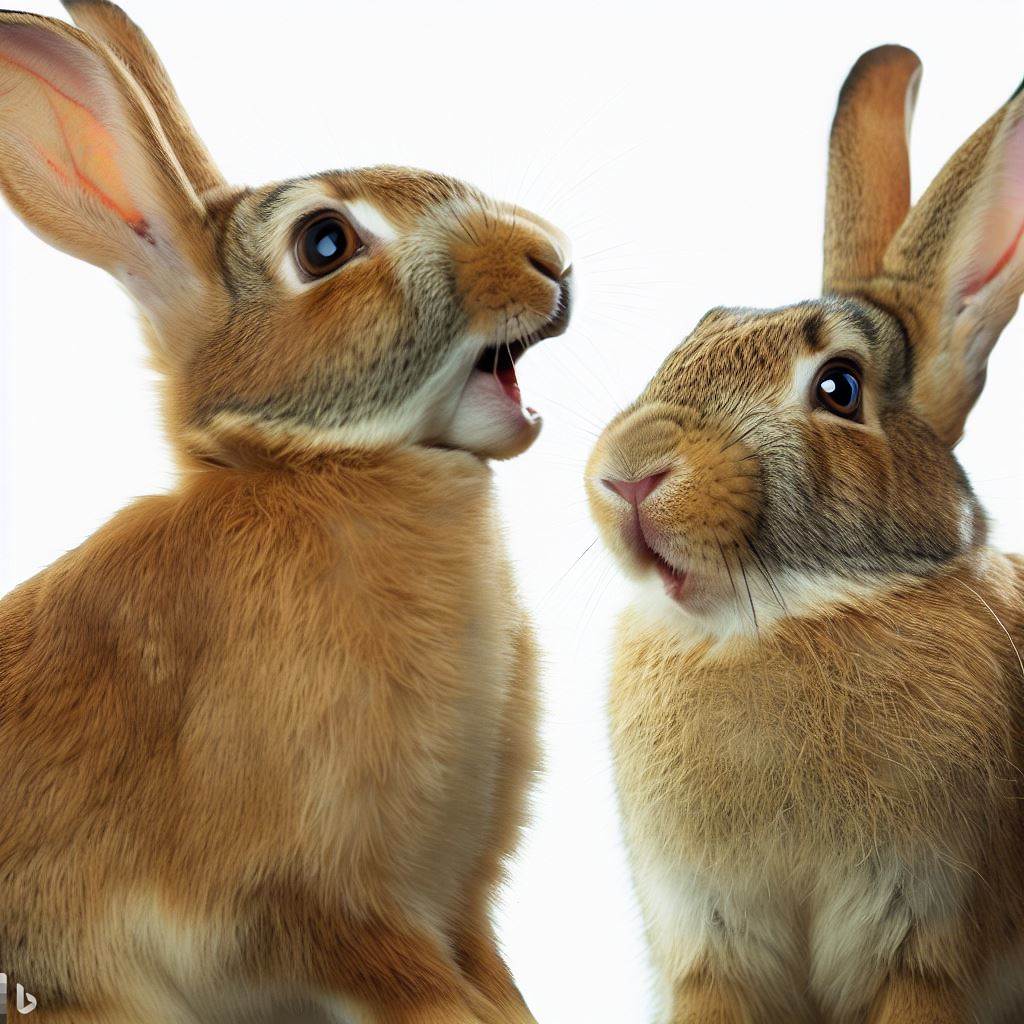
Emotional Responses
It is known that rabbits express joy through playful hops and binkies, which involve jumping and twisting their bodies in mid-air. They may not shed tears like humans, but they can express their emotions differently. As a warning sign to others, rabbits often thump their hind legs on the ground when frightened.
A rabbit’s strong bond with its human and rabbit companions makes them highly social creatures. By grooming and nuzzling, rabbits seek comfort and reassurance. As a result of these affectionate behaviors, rabbits demonstrate their emotional depth.

Tears of Pain: Understanding Rabbit Eye Discharge
As an emotional response, rabbits do not shed tears but can experience eye discharge, which is mistaken for crying. Eye discharge in rabbits usually appears as a thick, white, or yellowish substance that builds up around their eyes. It may indicate a variety of health issues, including
It is also known as “pink eye” and can cause redness, swelling, and discharge from the eyes. Conjunctivitis affects the delicate membrane that covers the inner surface of the eyelids and the white part of the eye.
Epiphora occurs when tears produce too much, leading to watery eyes and a discharge. It can be caused by dental problems, blockage of tear ducts, or other underlying medical conditions.
Infections
Rabbits can have eye discharge due to bacterial or viral infections. If left untreated, these infections can cause complications.
You should consult a veterinarian if your rabbit exhibits any signs of eye discharge to provide a proper diagnosis and treatment plan.

Maintaining Rabbit Well-being
The following are a few factors to consider when caring for rabbits, even though they don’t cry tears of emotion.
Proper Diet and Nutrition
Rabbits need a diet rich in hay, fresh vegetables, and a limited amount of pellets to maintain good dental health and digestive function.
Safe and Stimulating Environment
For rabbits to thrive, their environment must be safe and stimulating. Their living space should be spacious enough for them to move around comfortably. Provide a variety of hiding spots, tunnels, and toys to stimulate their mental and physical activities.
Regular Veterinary Care
It is imperative to schedule regular veterinary check-ups to ensure that your rabbit’s health is monitored and any potential issues are caught early on. Vaccinations, parasite control, and dental examinations are all aspects of your rabbit’s routine healthcare.
Social Interaction and Companionship
Providing your rabbit with a compatible companion is important to prevent loneliness and ensure their emotional well-being. Proper introductions and supervision are necessary when introducing new rabbits to each other.
Grooming and Hygiene
It is important to brush rabbits regularly to prevent matting and hairballs and to trim their nails periodically to prevent overgrowth. Rabbits are meticulous groomers but may need assistance maintaining their hygiene.
Exercise and Playtime
Regular exercise and playtime are essential for rabbits to stay active and healthy. Provide them with opportunities to hop, run, and explore outside of their enclosure in a safe and supervised manner. Remember to rabbit-proof the designated play area to prevent accidents or access to hazardous materials.
Bonding and Building Trust
Developing a trusting bond with your rabbit is crucial for its emotional well-being. Take the time to play with them, interact gently with them, and give them treats and praise as you earn their trust.
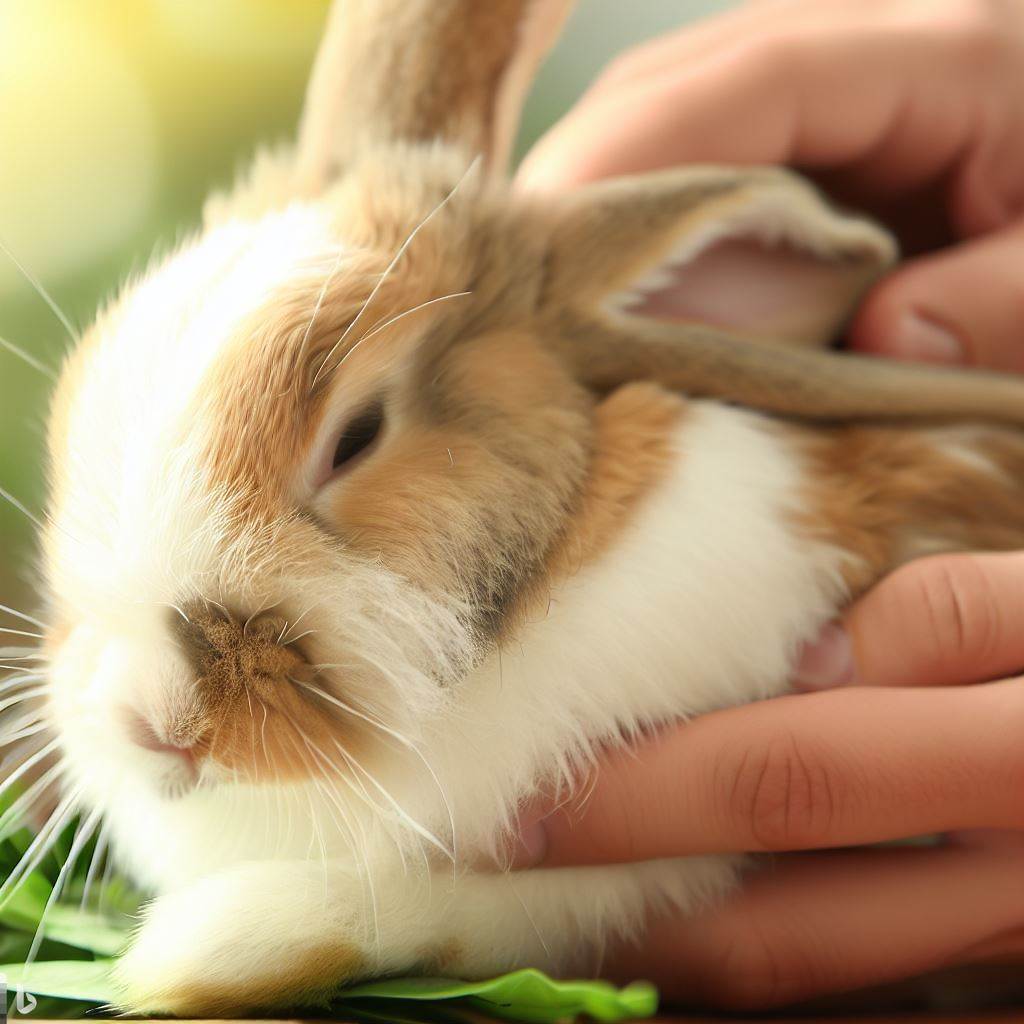
Caring for Your Rabbit: Tips to Promote Emotional Wellbeing
Despite their cuteness and intelligence, rabbits make wonderful companions. Our goal is to provide you with valuable tips on caring for your rabbit and promoting their emotional well-being to ensure their overall well-being.
Provide a Safe and Stimulating Environment
Providing your rabbit with a spacious and secure living environment is essential to their emotional well-being. To keep them mentally engaged and prevent boredom, offer a variety of toys and chewable items to keep them distracted. Include hiding spots and tunnels to simulate their natural burrowing instincts.
Spend Quality Time Together
The rabbit thrives on companionship as a social animal. Spend quality time with your rabbit every day. Pet them, rub their heads, or engage in interactive play. Bonding with your rabbit during this time will promote trust and emotional health.
Establish a Routine
You should establish a consistent daily routine for your rabbit to reduce stress and increase their comfort and security. Rabbits are creatures of habit and thrive on predictability.
Provide a Balanced Diet
To keep your rabbit happy and healthy, you must provide him with fresh hay, high-quality pellets, and various fresh vegetables. Consult your veterinarian to ensure your rabbit’s diet meets its nutritional needs. Excessive treats and sugary foods can cause digestion problems and obesity in your rabbit.
Create a Quiet and Calm Environment
Creating a peaceful and calm environment for your rabbit is important to ensure their emotional well-being. Keep their enclosure in a quiet part of the house, away from loud appliances or high-traffic areas. Your rabbit will feel safer and more relaxed if you provide a serene environment.
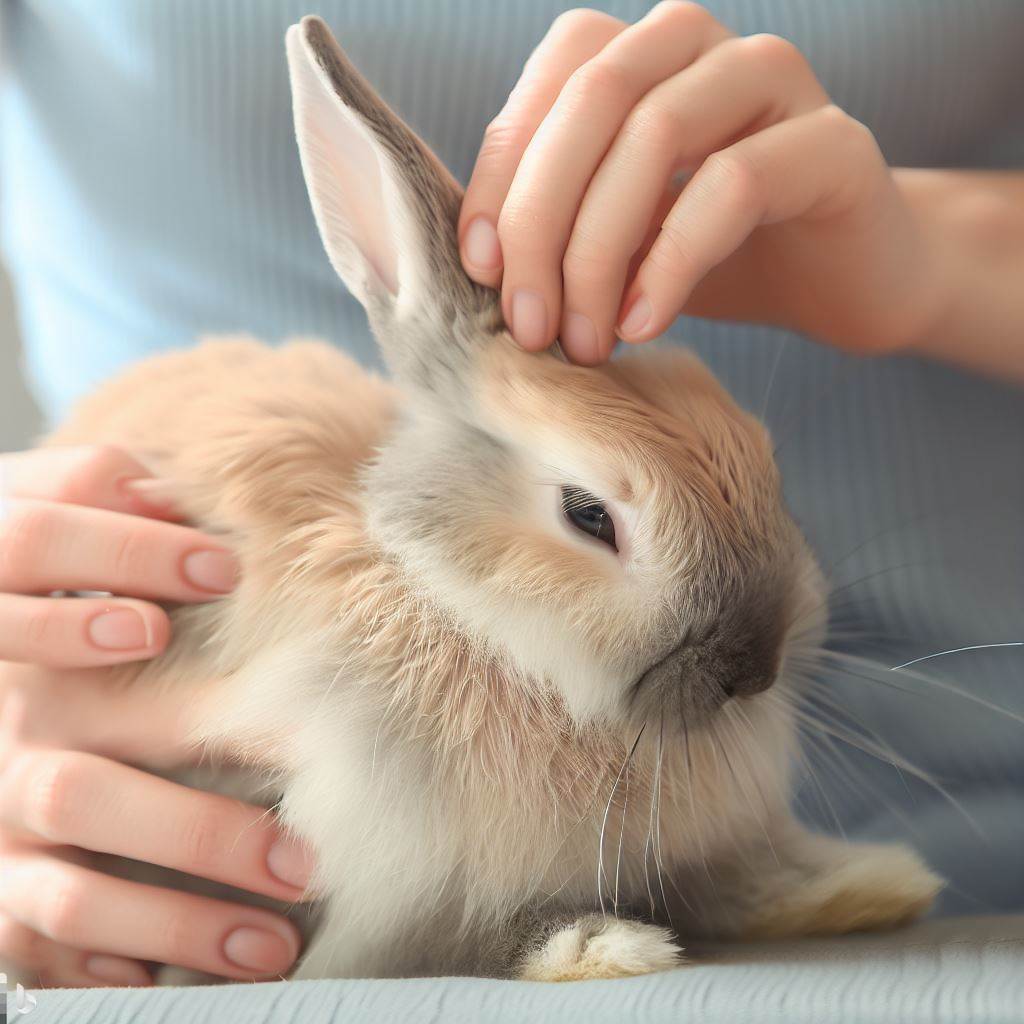
Recognizing Rabbit Stress: Signs, Symptoms, and Solutions
Despite their adorable and cuddly nature, rabbits can experience stress like any other living creature. As a responsible rabbit owner, you should recognize the signs and symptoms of stress in your furry friend and take appropriate steps to help ease it.
Signs and Symptoms of Rabbit Stress
Changes in Behavior
Any change in routine can cause stress to rabbits, so if your rabbit becomes more aggressive or less social or behaves unusually, it may be a sign that it is stressed.
Loss of Appetite
There is a risk that a stressed rabbit may lose interest in eating, causing digestive problems for the rabbit.
Fur Loss
Your rabbit may shed more than usual if it is over-groomed or suffers from fur loss due to stress.
Hiding
A rabbit that hides more often than usual may be experiencing stress. Rabbits may seek refuge in their cabinet or under furniture.
Abnormal Posture
Rabbits who are stressed may display abnormal postures such as hunching or crouching.
Solutions for Rabbit Stress
Provide a Safe Environment
The environment in which your rabbit lives plays an important role in their mental health. Ensure your rabbit has a comfortable, safe, and spacious living space to explore.
Socialization
Spend time with your rabbit, play games, and pay attention to him. Rabbits are social animals and require interaction with other rabbits or humans.
Diet
A rabbit’s health depends on a balanced, nutritious diet. Provide your rabbit with fresh hay, water, and various fresh vegetables.
Reduce Noise and Light
Keep your rabbit’s living area dark and quiet, especially during sleeping hours. Loud noises and bright lights can be stressful to rabbits.
Exercise
You should provide plenty of opportunities for your rabbits to hop around and play to maintain their physical and mental health.
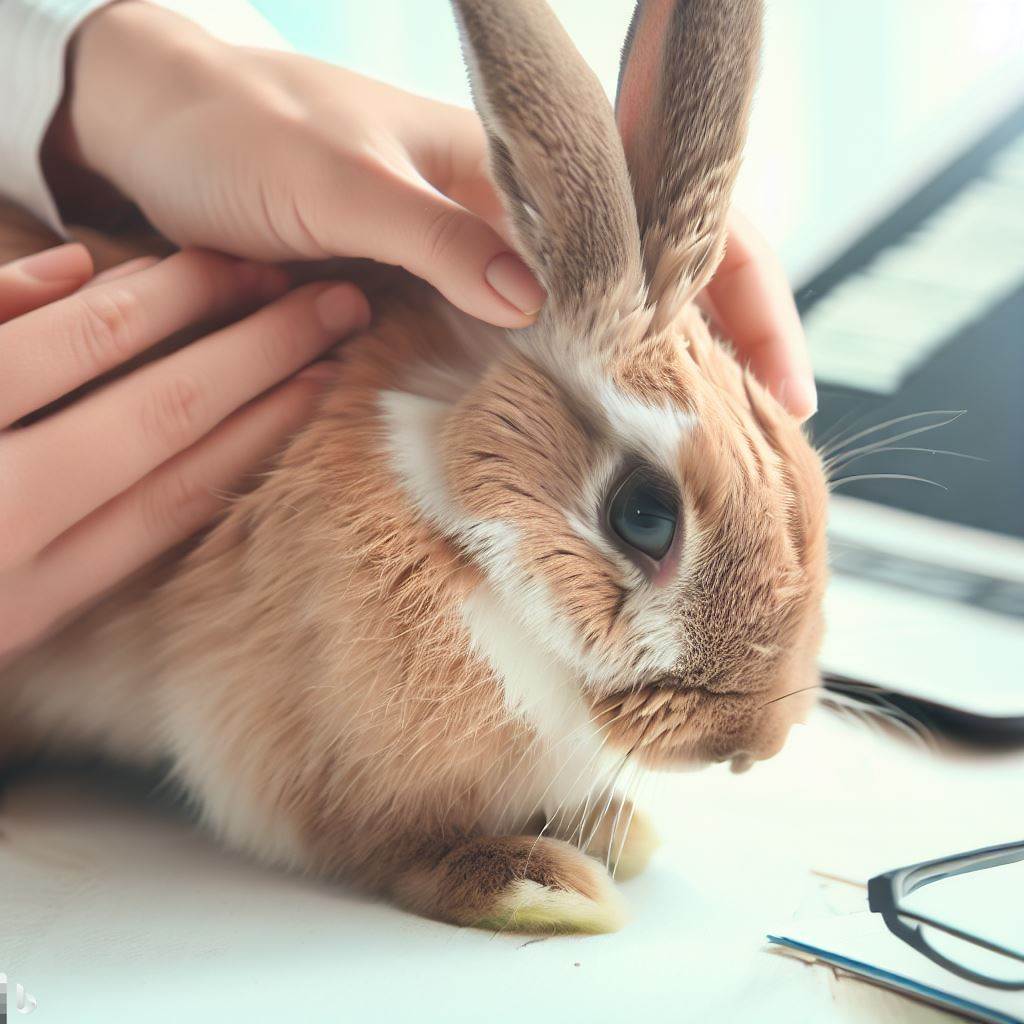
Do rabbits cry when they die?
The rabbit does not shed tears when it dies. It may exhibit certain behaviors or vocalizations when distressed but does not shed tears as an emotional reaction.
Do bunnies cry at night?
The sounds bunnies make at night, such as thumping their hind legs or whimpering, are not equivalent to crying, but can serve as forms of communication or signals of distress.
Why is my rabbit whimpering?
Your rabbit might be whimpering due to pain, discomfort, or fear. It may whimper when your rabbit is injured, experiencing digestive problems, or frightened. You should observe your rabbit’s behaviour closely and consult a veterinarian if you are concerned about their health.
Why does my rabbit have tears?
For various reasons, rabbits may have eyes that are discharged or teary. Excessive tearing or discharge may indicate an underlying health issue, such as an eye infection, dental problems, or allergies. You should consult a veterinarian if you notice persistent tear production or any other concerns.
What sound does a rabbit make in words?
While rabbits communicate with each other through vocalizations and body language, they do not have a specific sound they can describe in words. Rabbits make many sounds, including purring, grunting, honking, growling, and thumping their hind legs. The meaning and emotion of each sound vary depending on its context and accompanying body language.
Conclusion
In conclusion, while rabbits do not cry tears of emotion like humans, they possess a rich repertoire of communication methods to express their feelings. We can connect with these endearing creatures more deeply if we understand their body language, vocalizations, and emotional responses.
It is important to provide rabbits with a safe, stimulating environment, a proper diet, regular veterinary care, social interaction, grooming, exercise, and a strong bond of trust to maintain their well-being. You must prioritize these aspects to ensure your rabbit leads a happy and fulfilling life.
